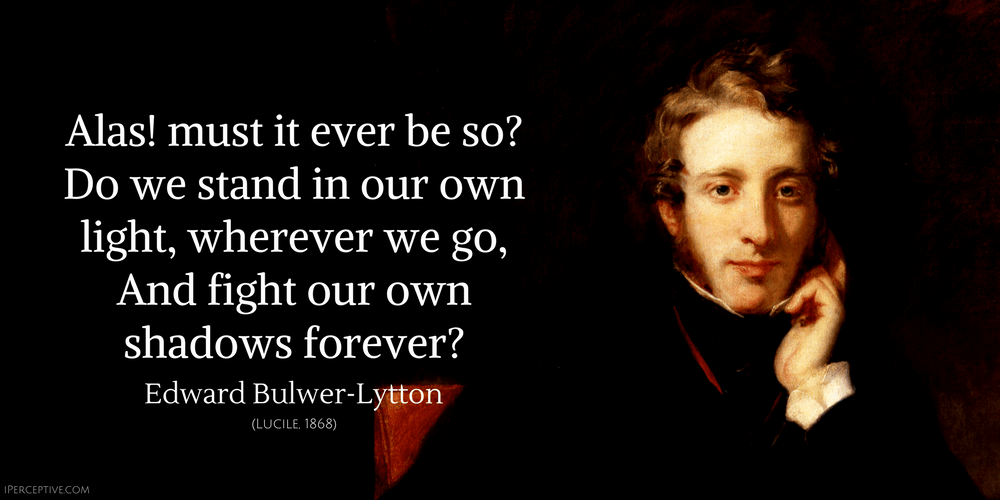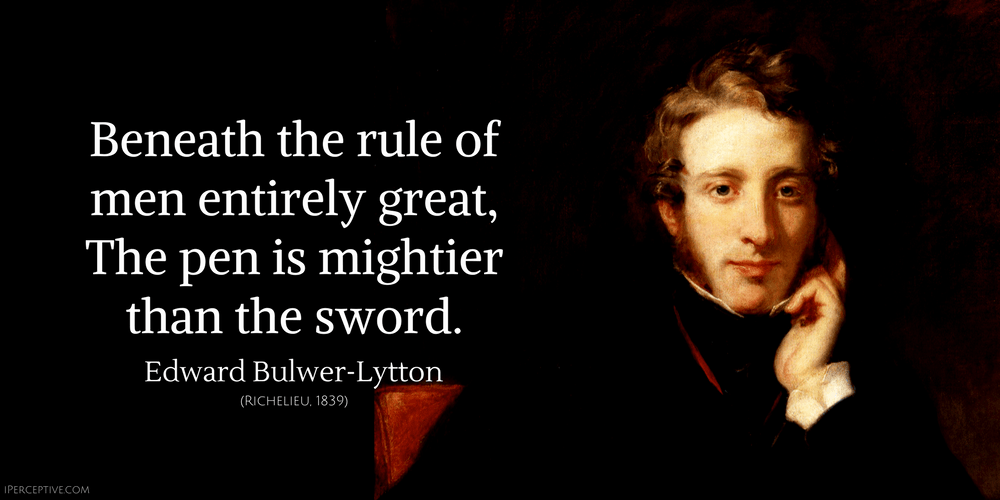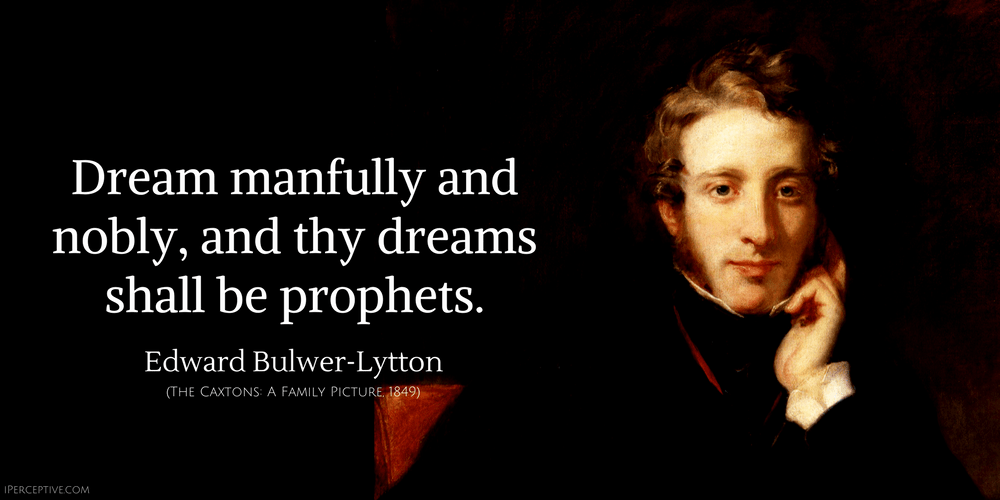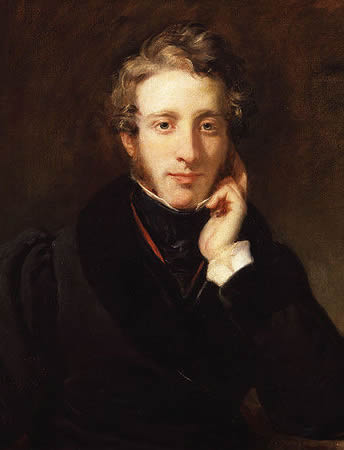Edward Bulwer-Lytton Quotes

A good heart is better than all the heads in the world.
One of the sublimest things in the world is plain truth.
It is not by the gray of the hair that one knows the age of the heart.
Anger ventilated often hurries toward forgiveness; and concealed often hardens into revenge.
When people have no other tyrant, their own public opinion becomes one.
The same refinement which brings us new pleasures, exposes us to new pains.
Talent does what it can,
Genius does what it must.
The true spirit of conversation consists in building on another man's observation, not overturning it.
O be very sure That no man will learn anything at all, Unless he first will learn humility.

Alas! must it ever be so?
Do we stand in our own light, wherever we go,
And fight our own shadows forever?
A life of pleasure makes even the strongest mind frivolous at last.
Truth makes on the ocean of nature no one track of light; every eye, looking on, finds its own.
Art and science have their meeting point in method.
What a mistake to suppose that the passions are strongest in youth! The passions are not stronger, but the control over them is weaker! They are more easily excited, they are more violent and apparent; but they have less energy, less durability, less intense and concentrated power than in the maturer life.
There is no such thing as luck. It's a fancy name for being always at our duty, and so sure to be ready when good time comes.
In science, read, by preference the newest works; in literature, the oldest. The classics are always modern.
In order to love mankind, expect but little from them.
What men want is not talent; it is purpose.
Every man who observes vigilantly, and resolves steadfastly, grows unconsciously into genius.
Patience is not passive; on the contrary, it is active; it is concentrated strength.
Two lives that once part are as ships that divide.
In life, as in art, the beautiful moves in curves.
Strive, while improving your one talent, to enrich your whole capital as a man. It is in this way that you escape from the wretched narrow-mindedness which is the characteristic of every one who cultivates his speciality alone.
We tell our triumphs to the crowds, but our own hearts are the sole confidants of our sorrows.

Beneath the rule of men entirely great,
The pen is mightier than the sword.
Power is so characteristically calm, that calmness in itself has the aspect of strength.
Patience is the courage of the conqueror, the strength of man against destiny.
Laws die. Books never.
There is nothing certain in a man's life but that he must lose it.
Music, once admitted to the soul, becomes a sort of spirit, and never dies.
Fate laughs at probabilities.
If you wish to be loved, show more of your faults than your virtues.
A fool flatters himself, a wise man flatters the fool.
The easiest person to deceive is one's self.

Dream manfully and nobly, and thy dreams shall be prophets.
To find what you seek in the road of life,
the best proverb of all is that which says:
"Leave no stone unturned."
Love thou the rose, yet leave it on its stem.
When a person is down in the world, an ounce of help is better than a pound of preaching.
The magic of the tongue is the most dangerous of all spells.
Books are but waste paper unless we spend in action the wisdom we get from thought.
Master books, but do not let them master you. Read to live, not live to read.
Happiness and virtue rest upon each other; the best are not only the happiest, but the happiest are usually the best.
What is past is past, there is a future left to all men, who have the virtue to repent and the energy to atone.
The best teacher is the one who suggests rather than dogmatizes, and inspires his listener with the wish to teach himself.
He who esteems trifles for themselves is a trifler; he who esteems them for the conclusions to be drawn from them, or the advantage to which they can be put, is a philosopher.
Nothing is so contagious as enthusiasm; it is the real allegory of the lute of Orpheus: it moves stones, it charms brutes. Enthusiasm is the genius of sincerity, and truth accomplishes no victories without it.
Of all the agonies of life, that which is most poignant and harrowing, that which for the time annihilates reason, and leaves our whole organization one lacerated, mangled heart, is the conviction that we have been deceived where we placed all the trust of love.
I know not why we should delay our tokens of respect to those who deserve them until the heart that our sympathy could have gladdened has ceased to beat. As men cannot read the epitaphs inscribed upon the marble that covers them, so the tombs that we erect to virtue often only prove our repentance that we neglected it when with us.
"Know thyself," said the old philosopher, "Improve thyself," said the new. Our great object in time is not to waste our passions and gifts on the things external that we must leave behind, but that we cultivate within us all that we can carry into the eternal progress beyond.
No man can judge of the happiness of another. As the new moon plays upon the waves, and seems to our eyes to favour with a peculiar beam one long track amidst the waters, leaving the rest in comparative obscurity, yet all the while she is no niggard in her luster for though the rays that meet not our eyes seem to us as though they were not, yet, with an equal and unfavouring loveliness, she mirrors herself on every wave; even so, perhaps, happiness falls with the same brightness and power over the whole expanse of life, though, to our limited eyes, she seems only to rest on those billows from which the ray is reflected back upon our sight.
There are two periods in the life of man in which the evening hour is peculiarly interesting, in youth and in old age. In youth, we love it for its mellow moonlight, its million of stars, its thin, rich, and shooting shades, its still serenity; amid those who can commune with our loves, or twine the wreaths of friendship, while there is none to bear us witness but the heavens and the spirits that hold their endless Sabbath there, or look into the deep bosom of creation, spread abroad like a canopy above us, and look and listen till we can almost see and hear the waving wings and melting songs of other worlds. To youth, evening is delightful: it accords with the flow of his light spirits, the fervour of his fancy, and the softness of his heart. Evening is also the delight of virtuous age: it seems an emblem of the tranquil close of busy life, serene, placid, and mild, with the impress of its great Creator stamped upon it: it spreads its quiet wings over the grave, and seems to promise that all shall be peace beyond it.
We too. All passes, and must pass away
There's nothing certain in man's life but this
That he must lose it. Every hour's a thief,
And all the world's unstable. Who's assured
The sun will rise tomorrow? Each man stands
Poised on this little pinnacle of time
The ever-crumbling moment, eminent
In midst of such innumerable mischance
That nothing is, or is conceivable,
Of strength or size so insignificant
But what it may upset him! None is safe,
Sleeping or waking. And between us all
And what shall be the end of us at last
There's nothing but our ignorance of it.

